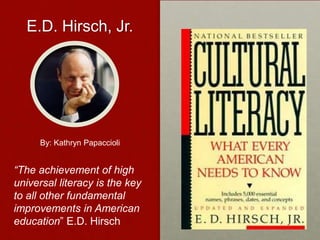
Hirsch 2013
- 1. E.D. Hirsch, Jr. By: Kathryn Papaccioli “The achievement of high universal literacy is the key to all other fundamental improvements in American education” E.D. Hirsch
- 2. Getting to Know E.D. Hirsch Biography E.D. Hirsch – Educational Philosophy
- 3. What Is Cultural Literacy? “I call cultural literacy, namely, the network of information that all competent readers possess. It is the background information, stored in their minds, that enables them to take up a newspaper, and read it with an adequate level of comprehension, getting the point, grasping the implications, relating what they read to the unstated context which alone gives meaning to what they read.” E.D. Hirsch, 1988
- 4. What is the Importance of Cultural Literacy for Education? • “Our chief instrument of communication over time and space is the standard national language, which is sustained by national literacy (Hirsch, 1988).” • In order to effectively communicate with each other, we must be able to grasp the context and meaning associated with the language • Without a common shared knowledge, written and oral communication becomes more complex and tedious • To function in the modern world of changing ideas, events, and challenges, students must grasp a universal, shared knowledge • Schools are the most influential institutions in terms of conveying the shared knowledge that is necessary for high- level literacy.
- 5. Are You Culturally Literate? Check out this video of Read this article from E.D. Hirsch on the Psychology Today McNeil/Lehrer News Hour http://www.psychologytoday.co http://www.youtube.com/w m/blog/finding-the-next- atch?v=ROIujiY1uZU einstein/201105/are-you- culturally-literate • How many terms were you able to place into context? • Do you think today’s students would be able to correctly identify these terms? • How relevant is this in terms of literacy instruction?
- 6. Hirsch & • In 1986, one year before publishing “Cultural Literacy: What Every American Needs to Know” he founded the Core Knowledge Foundation • The Foundation is based upon Hirsch’s theory that “reading comprehension requires not just formal decoding skills, but also wide-ranging background knowledge.” • The foundation supports the Common Core Standards Initiative, which emphasizes the importance of “students reading texts across disciplines and building a foundation of knowledge that will give them the background to be better readers in all content areas” • Along with other scholars, Hirsch sought to develop a knowledge- based curriculum to be implemented in grades K– 8
- 8. Critics of Cultural Literacy • Treats children as receptacles for facts • Discourages children from participating in the learning process • Negates experience as a Read More: valuable part of developing • http://www.huffingtonpost.com/joel- critical thinking and evaluation shatzky/educating-for-democracy- of language and context e_b_411085.html •Who will be in charge of • http://www.scu.edu/ethics/publicatio determinining these core ns/iie/v1n4/homepage.html components?
- 9. The Cultural Literacy Controversy • Critics argued that Hirsch was elitist to presume that he; a privileged, white, male, should decide what American students learn • His opponents disputed the importance of some of the core contexts, citing them as subjective and even racist • Hirsch countered, stating, “Cultural literacy constitutes the only sure avenue of opportunity for disadvantaged children, the only reliable way of combating the social determinism that now condemns them to remain in the same social and educational condition as their parents.” • He claimed the progressive pedagogy, which promoted the doctrine of teaching children to “learn how to learn,” deprived children of valuable knowledge • Many scholars of today have reconsidered the importance of core concepts in providing students with an equal and quality education
- 10. What do you think the other philosopher’s we have studied would say about Hirsch and Cultural Literacy? What terms would they be sure to include? What terms do you think should be included?
- 11. In Today’s Classroom This video is a visual This video shows one representation of some terms teacher’s experience with found in “Cultural Literacy” cultural literacy and how she suggests we share with students http://www.youtube.com/watc http://www.youtube.com/wat h?v=pUiwaI8E0iU ch?v=p9P9nIm0DQY How can we incorporate cultural literacy into our classrooms?
- 12. References: Andre, C. & Velasquez, M. (1988, Summer). What Johnny should read. Issues in Ethics, 1(4), Retrieved from http://www.scu.edu/ethics/ publications/iie/v1n4/homepage.html Coppola, J. (2011, August 18). The education theory of E.D. Hirsch. Retrieved from http://www.newfoundations.com/GALLERY/Hirsch.html Core Knowledge Foundation. (2013). Common core state standards. Retrieved from http://www.coreknowledge.org/ccss Core Knowledge Foundation. (2013). Core knowledge at a glance. Retrieved from http://www.coreknowledge.org/mimik/mimik_uploads/documents/23/SequenceataGlance.pdf Core Knowledge Foundation. (2013). E.D. Hirsch Jr.. Retrieved from http://www.coreknowledge.org/ed-hirsch-jr Cultural illiteracy [Television series episode]. (1987). In The MacNeil Lehrer News Hour. Retrieved from http://www.youtube.com/watch?v=ROIujiY1uZU (2009). Cultural literacy. (2009). [Web Video]. Retrieved from http://www.youtube.com/watch?v=p9P9nIm0DQY E.D. Hirsch Jr. In (2013). Wikipedia. Retrieved from http://en.wikipedia.org/wiki/E._D._Hirsch,_Jr. Hirsch, E. D. ,. J. (1988). Cultural literacy: What every American needs to know. New York: Vintage Books. New Learning. (2012). E.D. Hirsch on cultural literacy. Retrieved from http://newlearningonline.com/new-learning/chapter-7- knowledge-and-learning/ed-hirsch-on-cultural-literacy/ Schweizer, B. (2009). Cultural literacy: Is it time to revisit the debate?. The NEA Higher Education Journal, Fall, Retrieved from http://www.nea.org/assets/docs/HE/TA09CulturalLiteracy.pdf Shatzky, J. (2010, January 05). [Web log message]. Retrieved from http://www.huffingtonpost.com/joel-shatzky/educating-for- democracy-e_b_411085.html Shivley, C. (Producer). (2010). Cultural literacy. [Web Video]. Retrieved from http://www.youtube.com/watch?v=pUiwaI8E0iU Stern, S. (2009). E.D. Hirsch's curriculum for democracy. City Journal, 19(4), Retrieved from http://www.city- journal.org/2009/19_4_hirsch.html Wai, J. (2011, May 23). [Web log message]. Retrieved from http://www.psychologytoday.com/blog/finding-the-next-